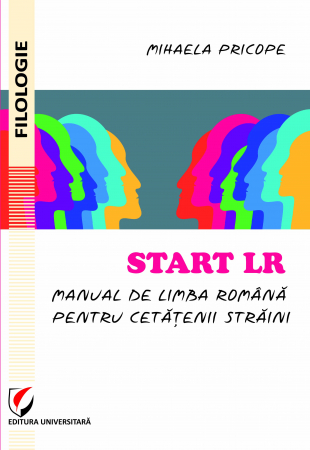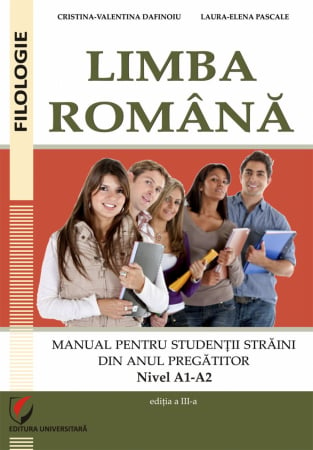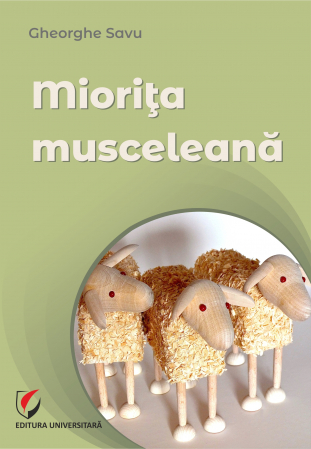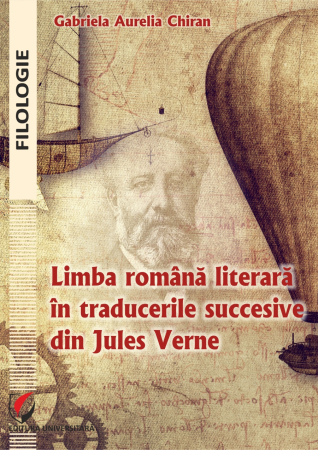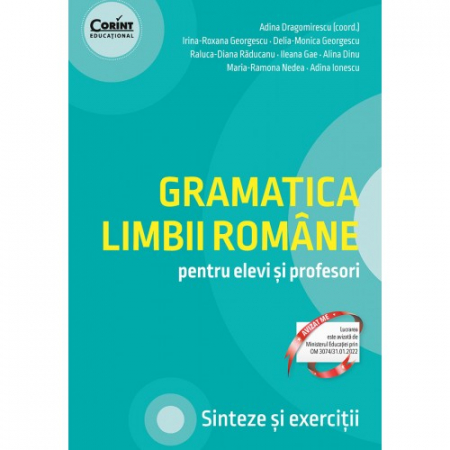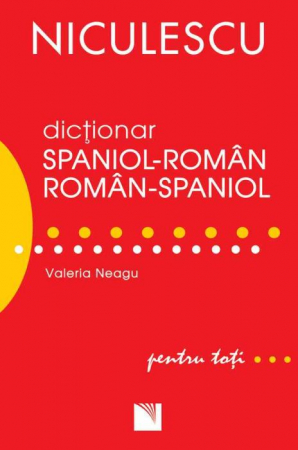ISBN: 978-606-28-0467-1
DOI: 10.5682/9786062804671
Publisher year: 2016
Edition: I
Pages: 370
Publisher: Editura Universitară
Author: Mara Magda Maftei
- Description
- Download (1)
- Authors
- Content
- More details
- Reviews (0)
-
Radacinile ideologice ale lui Cioran
Download

MARA MAGDA MAFTEI, author and Romanian-French citizen, is currently an associate professor at the Academy of Economic Studies in Bucharest. After a doctoral thesis defended in 2007 in the history of economic thinking (ASE), follows a second thesis entitled Cioran and the young generation, completed in 2009 and defended at the University of Bucharest. Part of the research dedicated to Cioran and the interwar period was the subject of a book published in two editions in 2009 and 2011 by Editura Contemporanul and another published in 2013 by Editura l'Harmattan, Paris, Cioran et le rêve d'une génération perdue. In June 2016, another book was printed by the Parisian publisher Yves Michalon, Un Cioran inédit. Why is he intriguing? Since 2008, the author has been an associate researcher at the Thalim Research Center (Théorie et histoire des arts et des littératures de la modernité XIXe - XXIe siècles), Université Sorbonne Nouvelle Paris 3. Permanent contributor to the literary magazines Viata romaneasca (2001-2008) and Contemporanul, sole author of multiple scientific articles published in the USA, Canada, France, guest lecturer over time in Lebanon (Kaslik), Brazil (Sao Paulo), Ireland ( Galway), Turkey (Izmir), Canada (Québec) on the subject of engaged literature (relations between literature, history, doctrines, society), the author has a career in the field of over fifteen years.
CHAPTER 1
THE ROMANIAN WORLD IN THE PERIOD 1918 - 1944/7
1. The economic-social, political and ideological climate / 7
2. Democracy Vs. authoritarianism / 18
3. Philosophy and politics of the “young generation” / 49
CHAPTER 2
A DOCTRINAL AND IDEALIST CIORAN / 86
1. Cioran pessimistic and optimistic - his philosophical readings / 86
2. Totalitarianism and liberalism in the Cioranian writings / 117
3. The ideational origin of the Romanian lands identified by Cioran / 136
4. Cioran's skepticism. The Romanian people face to face with the nations / 154
5. How far is Cioran the faithful student of Nae Ionescu / 172
CHAPTER 3
PRIVILEGED RELATIONS. ROMANIAN PERIOD / 190
1. What Cioran retained and projected from the ideology of his generation / 190
2. Cioran and Mircea Eliade / 193
3. Cioran and Eugen Ionescu / 216
4. Cioran and Constantin Noica / 231
5. Cioran and Mircea Vulcanescu / 246
6. Petru Comarnescu and Mihail Sebastian - rapporteurs of the phenomenon of the “young generation / 251
CHAPTER 4
CIORAN AND HIS GENERATION IN EXILE / 271
1. Separation from Romanian history / 271
2. Former nationalists in front of the Romanian communism and of the western left / 278
3. Memorialistics of youth and exile / 294
4. How the problem of the Romanian being was solved - Cioran and Noica / 307
CHAPTER 5
FROM THE PERSPECTIVE OF TIME / 318
1. The Romanian being and its political destiny in the Naeionescian teachings. The legacies of the “exiled young generation” / 318
2. Cioran's relationship with History. French writings / 329
3. The unity of the “young generation” - the epistolary exchange / 342
SELECTIVE BIBLIOGRAPHY / 351
The generation of the '30s was created by Nae Ionescu, there is no doubt. He was the teacher, master and guide of all. Nae Ionescu formed a generation by inculcating the idea of the need to fulfill a mission. Even those who did not love him, at least hated him and in this way referred to him constantly. In addition, the generation was based on an enviable cohesion, fueled by the common belief or rather by the desire to take Romania out of anonymity and to create a historical destiny for it. We recognize here again the obsession of Nae Ionescu, for whom historical destiny meant following the traditionalist path, of autochthonism, therefore the purification of liberal western fantasies, and for a Cioran this historical destiny was translated by assuming a messianic nationalism that annuls any docile past and to change the passive mentality of the Romanian people. None of them was right and none of them succeeded in their endeavor, especially since the moment of the establishment of communism by force annulled any hypothesis and any ideational debate.
The generation educated by Nae Ionescu, however, fulfilled its mission, through Cioran, Eliade and Ionescu, the three Romanians who went to the West and thanks to whom the Romanian culture came out somewhat from the barriers of Eastern Europe. It was a united generation, a generation that in the Romanian period is produced in journalism with a fecundity never seen before or even after that. Everything was happening in the press. Even before 1945, but especially after, the unit was preserved thanks to the correspondence between the former representatives. Nothing is more authentic, however, than a generation that was built at the department, apparently in an artificial way, but thanks to a professor who introduced the idea of frantic living of any everyday phenomenon, which was polished through journalism, seminars and imposed by erudition, keeping alive the memory of the period of formation of the group through the exchange of letters. It is about a generation that has assumed its feelings to the end, some representatives paying with imprisonment and death for this "guts", but which in the end knew how to preserve the ideal of youth from friendship.
What was Cioran before meeting Nae Ionescu and before he awakened in him the revolutionary feeling, the feeling that he has a mission Cioran travels the route from a bored student, who takes himself as the center of the universe and exacerbates his own feelings and the imagined sufferings, in Pe culmile disperarii (On the heights of despair) until the Schimbarea la fata a Romaniei (Change in the face of Romania) that is, until the assumption of a national mission and the move of the center of gravity from a personal suffering, "played", to a real, national, serious one. It is the distance between how to suffer for an imagination and how to pay for a conviction. Twelve letters from Cioran's youth, a student at the Faculty of Letters and Philosophy in Bucharest, letters sent to his childhood friend, Bucur Tincu, attest that that Cioran before the moment Nae Ionescu and before his political engagement, was terribly bored in the environment academic. Cioran longed for an authentic experience of reality in the parameters of pain, despair and suffering. "Individual destiny, he wrote to Bucur Tincu on September 23, 1931, as an inner, irrational and immanent reality, is revealed to us only in pain, that it is the only positive way of inner understanding of personal problems." He still assumes from these letters the status of cynic, towards his own person, his own destiny, and later towards the national cause, which remained forever unfulfilled. "If I live," concludes the young expert on the issue of death, "I will stand out with an extreme attitude; I will fearlessly draw the last consequences. I'm not afraid of any ideas or attitudes. Here I am called a "cynic." If cynicism means sincerity taken to paroxysm, then I am definitely cynical. " Cioran shows us in this commitment of his, once again, that he is the faithful student of Nae Ionescu, by assuming an identity of conscience. He will fulfill his prophecy forever and will remain a cynic, a skeptic about his own fate, but especially that of his homeland. The eternal tenant of the attics was a lover of extremes in life and in writing.

6359.png)
![Cioran's Ideological Roots [1] Cioran's Ideological Roots [1]](https://gomagcdn.ro/domains/editurauniversitara.ro/files/product/large/radacinile-ideologice-ale-lui-cioran-569-967683.jpg)
